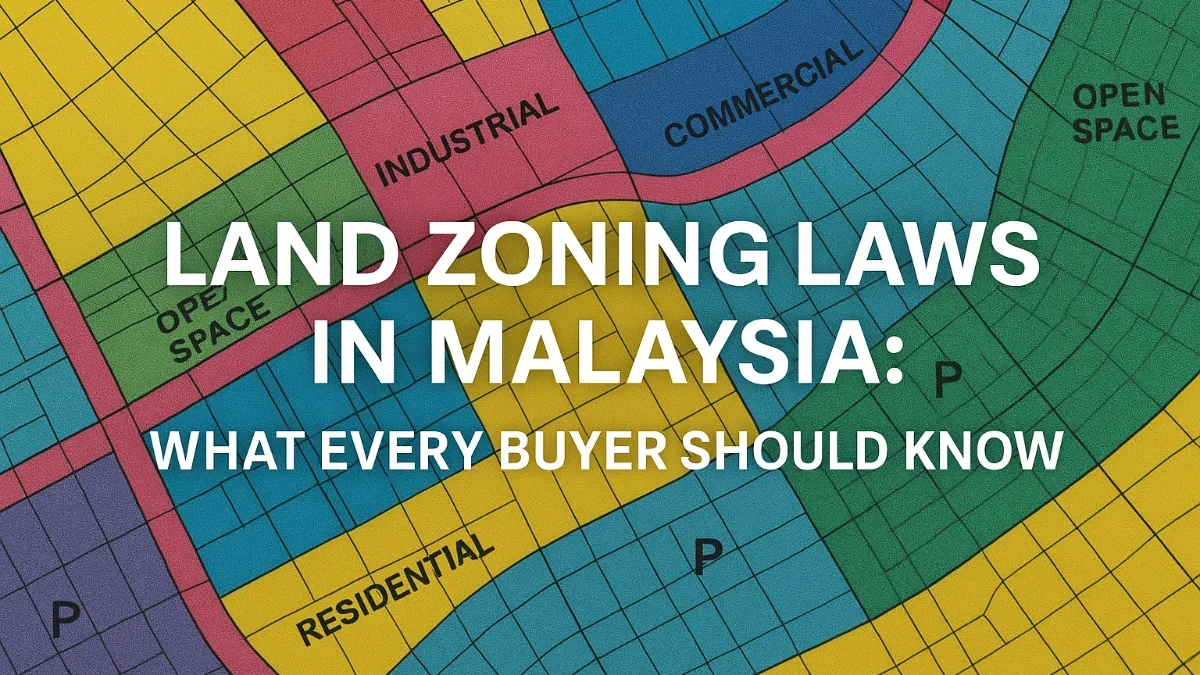This article explains Malaysia’s zoning laws, the government authorities involved, and how land zoning affects your development rights, investment plans, and approval timelines.
Introduction
In Malaysia, land zoning is not just a legal formality—it’s the foundation that determines how a parcel of land can be used. Whether you’re buying for investment, development, or business purposes, understanding zoning laws helps you avoid costly mistakes and unlock the full potential of your land.
What Is Land Zoning?
Land zoning refers to how local and state governments classify land based on permitted uses. Each zone comes with restrictions on what can and cannot be built or operated on that land.
Common Zoning Types in Malaysia:
-
Residential (Kediaman)
-
Commercial (Perniagaan)
-
Industrial (Perindustrian)
-
Agricultural (Pertanian)
-
Institutional/Public Use (Kemudahan Awam)
-
Mixed Development (Pembangunan Bercampur)
Each zoning type has specific guidelines for density, plot ratio, building height, access roads, and setbacks.
Who Controls Zoning in Malaysia?
1. State Governments
-
All land in Malaysia belongs to the state under the National Land Code.
-
State governments approve or reject zoning change (tukar syarat) applications.
2. Local Councils (PBT - Pihak Berkuasa Tempatan)
-
Examples: MBPJ (Petaling Jaya), MPK (Klang), MBSA (Shah Alam).
-
They issue zoning maps, regulate building plans, and control planning permissions.
-
Zoning is often outlined in the Local Plan (Rancangan Tempatan) and Structure Plan (Rancangan Struktur).
3. PLANMalaysia (formerly JPBD)
-
Oversees urban and regional planning across states.
-
Ensures zoning follows national and regional development strategies.
How Zoning Affects Development and Investment
1. Building Restrictions
Each zoning type controls:
-
Plot Ratio (density)
-
Maximum Floor Area
-
Types of permitted activities (e.g., heavy vs. light industry)
-
Parking requirements
2. Property Value
Zoning significantly impacts land value. Industrial and commercial zones typically have higher capital values and rental potential compared to agricultural land.
3. Development Approvals
Developing a factory on residential land or building offices on agricultural land is not allowed unless zoning is changed.
How to Check Zoning Before You Buy
-
Check the Title Deed (Geran/Surat Hakmilik)
Look for “Kegunaan Tanah” (Land Use) section. -
Visit the Local Council (e.g., MBPJ Planning Department)
Request a certified zoning verification letter or access GIS systems where available. -
Use Online Zoning Tools
Some councils (e.g., Selangor’s iPlan) offer zoning map access.
How to Change Zoning: Tukar Syarat
If the land’s zoning does not suit your intended use:
-
Submit a land use conversion application (Permohonan Tukar Syarat).
-
Approval required from:
-
Land Office (Pejabat Tanah)
-
Local Authority (Majlis Perbandaran)
-
Town Planning Department
-
-
Include development proposals, site plans, and fees.
-
Duration: 3–12 months, depending on complexity.
Zoning Case Study: MBPJ (Petaling Jaya)
MBPJ is one of the most active local councils in Klang Valley. Their Rancangan Tempatan MBPJ 2030 outlines all zoning allocations, building controls, and future development corridors.
-
Industrial zones: PJS, Section 51A, and Jalan Tandang
-
Commercial corridors: PJ New Town, SS2, and Damansara
If you're buying in areas under MBPJ, zoning checks are mandatory before you sign the deal.
Conclusion
Zoning laws are not just bureaucratic red tape—they are strategic tools that shape your property’s potential. Whether you’re developing a logistics hub or opening a retail business, your investment success begins with understanding what the land is zoned for.
Let Terra Group help you navigate the zoning process, identify compliant sites, and secure high-return investments across Klang Valley and beyond.
Contact us Call Kenneth 017-380 9993 Or WhatsApp our team directly for the latest availability



